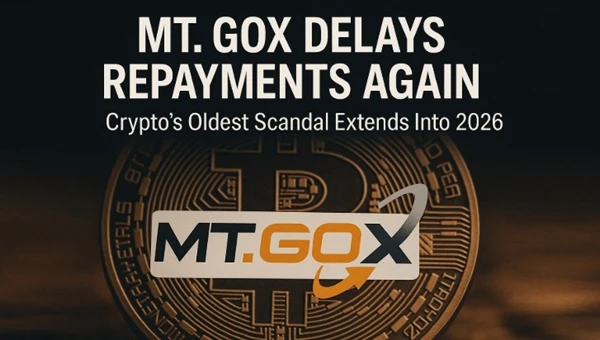


The statement landed on October 27, 2025, shaking creditor confidence and dampening the market’s optimism. Trustee Nobuaki Kobayashi, who has overseen Mt. Gox’s long and complex rehabilitation from Tokyo, received court approval to push the final distribution date from October 31, 2025, to the same date next year.
The delay, he explained, was necessary to finish processing the last wave of claims still under verification or technical review.
Roughly 19,500 creditors have already received initial distributions through partner exchanges Kraken and Bitstamp since mid-2024. But thousands more, many holding decade-old claims, remain trapped in bureaucratic limbo, waiting for Bitcoin and Bitcoin Cash lost to what remains the most consequential hack in crypto history.
A Collapse That Reshaped the Crypto World
When Mt. Gox collapsed in early 2014, the shockwaves rattled an unregulated Bitcoin market still in its infancy. At its peak, the Tokyo-based exchange processed more than 70% of global Bitcoin transactions.
Originally created by developer Mark Karpelès as a trading hub for Magic: The Gathering cards, Mt. Gox later became the center of early crypto activity, until a series of high-profile thefts exposed the industry’s structural weaknesses.
Hackers ultimately stole about 850,000 Bitcoin, worth around $460 million then and tens of billions today. Later investigations found that theft had been happening for years, hidden by weaknesses in transaction verification that let attackers duplicate withdrawals undetected.
Karpelès was arrested in Japan in 2015, accused of data manipulation and embezzlement, though he was later acquitted of fraud.
Bitcoin’s value plunged 36% within days of the Mt. Gox collapse, erasing years of gains and forcing exchanges worldwide to overhaul their security frameworks. The incident became the industry’s first true stress test, prompting widespread adoption of cold storage, proof-of-reserves, and tighter compliance.
The Long Road to Repayment
For many investors, the Mt. Gox saga has become a study in patience. Creditors lodged claims for more than 200,000 Bitcoin. The court-approved repayment plan, finalized in 2021, allocated 142,000 Bitcoin, 143,000 Bitcoin Cash, and ¥69 billion in cash for distribution, assets now worth over $9 billion at current market valuations.
Repayments finally began in July 2024, ending a decade of waiting for some Mt. Gox victims. Still, new challenges surfaced fast. Verification rules differed by country, many claimants lacked updated IDs or lost their old account access, and fiat conversions became unpredictable as Bitcoin’s price swings distorted exchange rates.
This is Mt. Gox’s third repayment delay, pushed from 2023 to 2024, then 2025, and now to 2026. Trustees say the added time ensures precise distributions and limits legal risks. Japan’s courts favor careful, complete resolutions, unlike Canada’s QuadrigaCX case, which closed out just two years after its 2019 crash.
Market Reaction: Relief Meets Resentment
The latest delay comes as Bitcoin hovers above $100,000, powered by ETF inflows and institutional demand. Mt. Gox still holds 34,689 BTC, about $4 billion, enough to move markets if released too fast.
Traders initially welcomed the news. Bitcoin rose 2%, viewing the delay as a pause from potential sell pressure. Analysts warn that a full payout could’ve added 0.16% to daily supply, weighing on prices. The extended plan mirrors FTX’s slow 2023 liquidations, which helped stabilize the market.
Creditors, though, are fed up. Online forums brim with anger over repeated delays and perceived mismanagement. A coalition representing roughly 10% of creditors has launched legal action seeking faster disbursement.
What’s Next?
Mt. Gox’s drawn-out resolution illustrates both the distance cryptocurrency has traveled and the hurdles it continues to face. Regulatory advances, from the EU’s MiCA framework to the SEC’s custody standards, have made markets safer, yet restitution across jurisdictions remains fraught with complexity.
Trustee Nobuaki Kobayashi’s office says automation in identity verification and fiat processing will expand through early 2026, with final crypto payouts to follow. Under Japanese law, however, unclaimed assets may eventually revert to the state; a cautionary note for inattentive creditors.
Even as Bitcoin flirts with new highs, some calling for $150,000 by year’s end, Mt. Gox stands as crypto’s reminder of where it started: ambitious, chaotic, and still learning accountability.
He has worked with several companies in the past including Economy Watch, and Milkroad. Finds writing for BitEdge highly satisfying as he gets an opportunity to share his knowledge with a broad community of gamblers.
Nationality
Kenyan
Lives In
Cape Town
University
Kenyatta University and USIU
Degree
Economics, Finance and Journalism


Facts Checked by Vlad Hategan

 Fact checked by
Fact checked by 
 eabungana@gmail.com
eabungana@gmail.com 